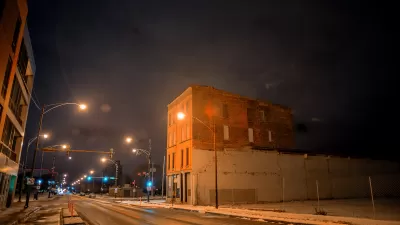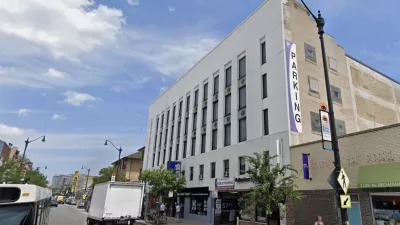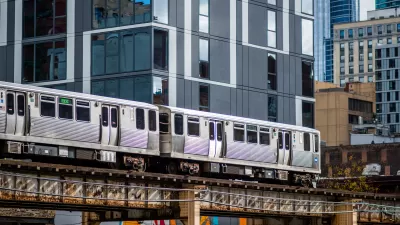A new study of transit-oriented growth in America's most transit-served cities reveals that Chicago lags way behind its peers. The area's enduring pattern of sprawling development is blamed.
"The Center for Neighborhood Technology (CNT) reports that Chicago, alone among the five metro areas with extensive transit service in the US, saw a decline in development in transit sheds relative to its region from 2000 to 2010," reports Robert Steuteville.
"The other four regions with at least 325 stations — New York, Philadelphia, Boston, and San Francisco — achieved growth in development within a half mile of transit stations, relative to their regions."
"As a result, Chicago Region residents are paying higher transportation costs and experiencing reduced access to jobs," says the report, Transit-Oriented Development in the Chicago Region: Efficient and Resilient Communities for the 21st Century [PDF].
"The findings indicate that urban sprawl has continued as the dominant development pattern in the Chicago region, said Scott Bernstein, president of the Center for Neighborhood Technology. The sprawl is accompanied by an increase in a typical household's transportation costs because of higher fuel prices," notes in The Chicago Tribune.
Thanks to newurban
FULL STORY: $1 billion needed for transit sheds in Chicago, report says

Maui's Vacation Rental Debate Turns Ugly
Verbal attacks, misinformation campaigns and fistfights plague a high-stakes debate to convert thousands of vacation rentals into long-term housing.

Planetizen Federal Action Tracker
A weekly monitor of how Trump’s orders and actions are impacting planners and planning in America.

San Francisco Suspends Traffic Calming Amidst Record Deaths
Citing “a challenging fiscal landscape,” the city will cease the program on the heels of 42 traffic deaths, including 24 pedestrians.

Defunct Pittsburgh Power Plant to Become Residential Tower
A decommissioned steam heat plant will be redeveloped into almost 100 affordable housing units.

Trump Prompts Restructuring of Transportation Research Board in “Unprecedented Overreach”
The TRB has eliminated more than half of its committees including those focused on climate, equity, and cities.

Amtrak Rolls Out New Orleans to Alabama “Mardi Gras” Train
The new service will operate morning and evening departures between Mobile and New Orleans.
Urban Design for Planners 1: Software Tools
This six-course series explores essential urban design concepts using open source software and equips planners with the tools they need to participate fully in the urban design process.
Planning for Universal Design
Learn the tools for implementing Universal Design in planning regulations.
Heyer Gruel & Associates PA
JM Goldson LLC
Custer County Colorado
City of Camden Redevelopment Agency
City of Astoria
Transportation Research & Education Center (TREC) at Portland State University
Jefferson Parish Government
Camden Redevelopment Agency
City of Claremont





























